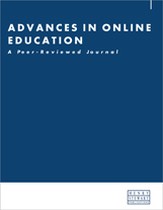Teaching in the hybrid virtual classroom
Abstract
Seven college lecturers and two senior support staff were interviewed during 2021 about their experiences teaching in hybrid virtual classrooms (HVC). These technology-rich learning environments allow teachers to simultaneously teach students who are in class (on campus) and students who are joining remotely (online). There were two reasons for this choice: first, ongoing experimentation from innovative teaching staff who were already using this format before the COVID-19 pandemic; secondly, as a possible solution to restrictions on classroom size imposed by the pandemic. Challenges lecturers faced include adjusting teaching practice and lesson delivery to serve students in the class and those online equally; engaging and linking the different student groups in structured and natural interactions; overcoming technical challenges regarding audio and visual equipment; suitably configuring teaching spaces and having sufficient pedagogical and technical support to manage this complex process. A set of practical suggestions is provided. Lecturers should make reasoned choices when teaching in this format since it requires continued experimentation and practice to enhance the teaching and learning opportunities. When external factors such as classroom size restrictions are the driving force, the specific type of synchronous learning activities should be carefully considered. The structure and approach to lessons needs to be rethought to optimise the affordances of the hybrid virtual and connected classroom. The complexity of using these formats, and the additional time needed to do it properly, should not be underestimated. These findings are consistent with previous literature on this subject. An ongoing dialogue with faculty, support staff and especially students should be an integral part of any further implementation in this format.
The full article is available to subscribers to this journal (subscription is free).
Author's Biography
Zac Woolfitt , MEd, is a Researcher and Lecturer at Inholland University of Applied Sciences in the Netherlands. He has conducted research into the effective use of video in higher education and the relationships between teaching, learning and technology. Since 2014, he has been examining the challenges teaching staff face when transitioning from face-to-face, to teaching via video: the shift from 3D to 2D and the new didactic. His research reflects practical experience of using video in higher education. He has recorded educational video in multiple formats as part of a blended approach to the flipped classroom. Since 2015 he has written a blog about ‘Video Teaching’ and published research on this subject. He presents his findings at international congresses and webinars. Inholland is a University of Applied Sciences in the Netherlands offering approximately 80 different bachelor courses over several campuses. Its focus is on quality education combined with close interaction with local and international industries; teaching and learning is supported by carefully embedded and appropriate technology.
Citation
Woolfitt, Zac (2023, June 1). Teaching in the hybrid virtual classroom. In the Advances in Online Education: A Peer-Reviewed Journal, Volume 1, Issue 4. https://doi.org/10.69554/KVEL4779.Publications LLP
